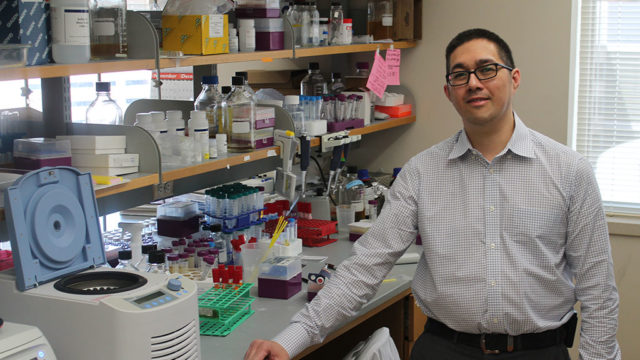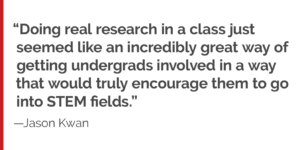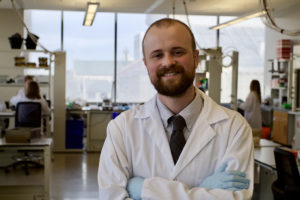
Jason Kwan is building better computational tools for exploring microbial communities and the small molecules they make
By Jill Sakai
Imagine you are working on a jigsaw puzzle. The pieces come in a few different shapes that can each link with every other shape, so you can’t rely on the shapes to figure out what goes where. There’s no overall reference picture, so you have to look for patterns in the few chunks already assembled to figure out what the full picture should look like.
Oh, and there are a few billion pieces.
That’s the puzzle faced by metagenomic scientists as they analyze the collective genetic material of organisms from any complex environment — a water sample, a swab of human skin, a chunk of soil — to explore the diversity and ecology of a microscopic community. Jason Kwan, an assistant professor in the Pharmaceutical Sciences Division of the University of Wisconsin–Madison School of Pharmacy, is working to make that re-assembly process a little easier.
This year, Kwan received a prestigious Faculty Early Career Development (CAREER) award from the National Science Foundation, funding that is granted to the country’s top young faculty in support of innovative research and their development as academic role models in research and education. Starting in summer 2019, the award will help him develop new bioinformatics approaches to explore the formation and ecology of microbial communities.
Kwan works at the intersection of computational biology, genetics and chemistry to study these communities and how they function, including how they make and use small molecules, such as antibiotics. That process begins with the raw genetic material.

Sequencing machines return bits and pieces of the DNA code, most just a few hundreds of base pairs long. Depending on the sample, there may be hundreds of millions of these fragments. The resulting genetic jumble contains the blueprints for the entire biological community. But to be read, the bits must be unscrambled and re-assembled.
One of Kwan’s areas of expertise is bioinformatics, or applying analytic techniques to large, complex datasets. He is developing ways to piece those genetic fragments together to reconstruct what species are present and how the community functions.
First he stitches the short DNA reads into larger sequences called contigs. The next step, he says, “is to figure out which contigs belong to the same genome, bearing in mind that you don’t know how many genomes are there. And you don’t know whether any of them are close to anything that’s been sequenced before.”
Current methods for sorting out, or binning, those contigs are slow, labor-intensive, and leave too much of the DNA unsorted, Kwan says. His group has already released one automated binning algorithm. With the new funding, he’ll be able to implement more of his ideas to make the process easier, more thorough, and more accurate. “The thrust of my CAREER proposal is to develop better binning algorithms to do this automatically, with no human intervention,” he says.
Kwan’s team will look for broad ways to coarsely classify the sequences based on shared evolutionary characteristics they can identify with a high degree of confidence. For example, they may not be able to tell one bacterial strain from another, but they may be able to distinguish bacteria from fungi and archaea. Within each group, they repeat the process, gradually breaking down the dataset with finer resolution. The ultimate goal is to resolve individual genomes.
The process is computationally demanding, and Kwan says it wouldn’t be possible without the powerful resources available at UW–Madison, such as the Center for High-Throughput Computing. “UW is quite unique in that it doesn’t charge for computational time, and that really helps us,” he says.

The resulting tools will be freely available for other researchers and broadly useful for many types of scientific questions, Kwan says. His group will be collaborating with UW–Madison soil scientist Thea Whitman to learn how new microbial communities form after catastrophic events such as forest fires. He is also interested in how and when bacteria make natural products such as antibiotics.
Kwan will also apply his bioinformatics tools in another venue: the classroom. In keeping with the CAREER program emphasis on integrating research and education, he is developing a new course to introduce UW–Madison undergraduates to cutting-edge data analysis methods and how to use them to answer real scientific questions.
The new class will follow the model of the global Tiny Earth Initiative, run by Wisconsin Institute for Discovery Director Jo Handelsman, which engages undergraduates in research through active discovery of antibiotics produced by soil microbes.
“The hands-on approach is a lot more social. They’re building collaboration skills in addition to research skills,” says Josh Pultorak, who teaches the Tiny Earth course at UW–Madison. Pultorak hears strong interest among his students in having more course opportunities like Tiny Earth on campus. He’s now working with Kwan to help design the bioinformatics class.
“Doing real research in a class just seemed like an incredibly great way of getting undergrads involved in a way that would truly encourage them to go into STEM fields,” Kwan says. “They investigate by themselves and get that experience of what it’s really like, finding out new things. After all, that’s the best part of doing science.”
Learn more about Assistant Professor Jason Kwan’s career and the research in his lab.